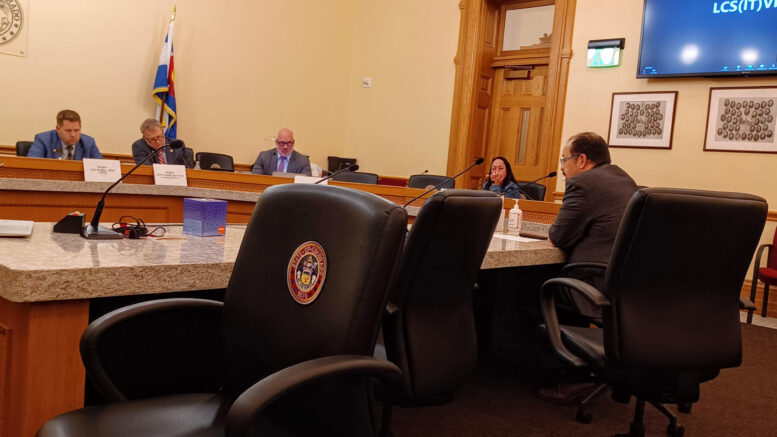Colorado’s attempt to craft the strictest transparency law in the country for transportation- and delivery-network companies crashed to halt Tuesday, stifled by what some of its critics called an unclear path to trying to achieve its stated purpose.
Senate Bill 98, sponsored by Democratic Sen. Robert Rodriguez of Denver, sought to require companies such as Uber, Lyft, DoorDash and Instacart to tell both their drivers and riders the cost of each ride, the percentage going to the driver and the percentage going to the company. It also would have required companies to disclose consumers’ locations and destinations to drivers before drivers’ decisions to accept rides, and it would have given the state the power to hear appeals of drivers deactivated from platforms and determine if they should be reinstated.
The gig-worker-transparency bill came as legislators have required greater transparency of other industries, particularly hospitals that must post their prices online so that non-emergency patients can better shop around for services. But while many of those transparency efforts have gotten sometimes bipartisan support, SB 98 ran into several issues.
Business issues with bill
In seeking to set national precedent on gig-worker transparency, the bill asked transportation companies to do things that would be impossible for them to undertake, said Harry Hartfield, senior public affairs manager for Uber in Colorado. For example, the company would not be able to pre-price the trip and give time frames for customers if the law were to ban the companies from knowing whether drivers would accept trips, and that would leave them unable to break down the bill in advance for both the driver and the customer, he said.
By barring companies from retaliating against drivers who decline to accept trips after receiving information about them, SB 98 would require companies who treat drivers who turn down all potential assignments the same as those who hustle to take assignments, said Laura Curtis, senior manager for Western government relations for DoorDash. Not only would that be burdensome for companies, but it would also be unfair to most of the hard-working gig drivers, she said.
And by allowing drivers to turn down assignments without any repercussions, the proposal could incentivize destination discrimination, warned Portia Prescott, president of the NAACP Rocky Mountain State Conference. She worries that some drivers would choose to wait for calls from Cherry Creek rather than go into poorer communities with more Black residents, such as Montbello, she told the Senate Finance Committee during an April 25 hearing.
Funding questioned also
A final nail in the bill’s coffin was the concerns about how it would be funded. The bill originally proposed taking money from the unemployment-tax-generated Employment Support Fund before the Colorado Department of Labor and Employment threatened to seek vetoes against any proposals raiding that fund. And while the fiscal note predicted a cost of about $700,000, a study from the Common Sense Institute predicted a cost that could be five-and-a-half times that high, based on data about the number of app-based drivers in the state.
“Before we overregulate an emerging industry, let’s look at all the platforms together,” suggested Kevin Hougen, president/CEO of the Aurora Chamber of Commerce.
After several delays, the committee voted Tuesday night to kill SB 98 by a 5-2 margin, with Democratic Sens. Kyle Mullica of Federal Heights and Kevin Priola of Henderson joining Republicans in opposing the measure, even after Rodriguez made last-minute changes. Mullica said that while testimony from drivers informed him that the state should look for a way to help them, the specifics of this bill were not the answer.
Gig workers drawing attention
But even in rejecting the bill, Democratic legislators seemed to indicate that they were not ready to end conversation about a gig sector that is expected to be a $455 billion piece of the American economy in 2023, according to some estimates.
Several drivers told the committee of hour-plus-long trips in which they ended up earning barely enough cash to cover gas money. Others spoke of being deactivated without appeal after a customer may have complained about something that wasn’t true or wasn’t their fault.
David Seligman, executive director of nonprofit law firm Towards Justice, noted that when Colorado decided nearly 10 years ago to regulate these companies, it did so with an “extraordinary” loophole that it would not require rate approval, as it does with other transportation firms. That’s left them using algorithms that “manipulate customers into paying as much as they can for a ride” without having to let drivers know how much that is, Seligman told the finance committee.
Mullica added that he hopes the industry is willing to come to the table after this legislative session, which is scheduled to end no later than Monday, and see what progress could be made toward consensus goals.
Industry leaders have made it clear, however, that several ideas put forward by the bill, such as inserting Colorado as the first state in the country to arbitrate deactivation decisions, are non-starters rather than areas for negotiation. And they remain concerned about any fees that may be suggested to pay for the regulation, particularly after the state imposed fees last year on both retail deliveries and the deliveries of riders in order to help fund the $5.3 billion infrastructure-improvement law from 2021.
